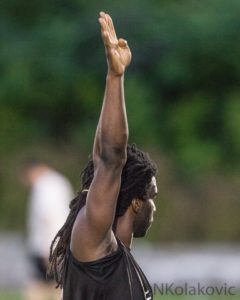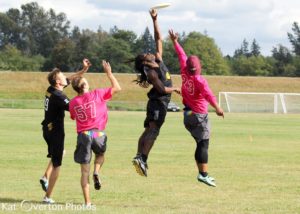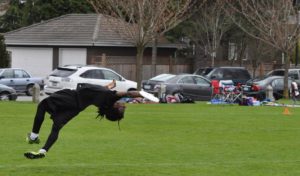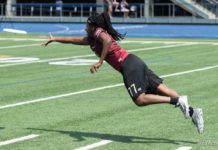Ultimate Canada Magazine – February 14, 2019
Black History Month takes place in Canada every February. Canadians are invited to participate in Black History Month festivities and events that honour the legacy of Black Canadians, past and present. You can find more information about the month here.

Our second instalment of these profiles features Jazz Groden-Gilchrist, who plays with Vancouver’s Blackfish.
Ultimate Canada: How did you get started in Ultimate?
Jazz Groden-Gilchrist: The summer after grade eight at a completely unrelated summer camp, we did Ultimate for a physical activity session led by Jon Hayduk. I was a speedy fella so he asked me to come out to one of the club team practices. I vividly remember starting with the gauntlet drill but having to run the disc to people because my throwing skills were equivalent to that of an bewildered llama, so immediately after, we agreed I should join the much more recreational Thunderclub instead. I attended the bi-weekly sessions led by Mike Fung throughout the summer, and played for Prince of Wales Secondary, coached by Jaimie and Colin Clay and then never really stopped playing. Ted Chu, Mimi Pan, Wendy LeBreton, Derek Cheng, Amanda Rak, and Manny Chanoine were my summer coaches in later years who were a big part of getting me into Ultimate at a competitive level.
UC: How has your experience been, being a player of colour in the community?

JG: I’ve been lucky enough to have not been a victim of negative experiences in ultimate regarding my heritage. Occasionally my teammates will make remarks about equating my athleticism to my skin colour, which used to catch me off guard, but overall, I can’t say I’ve ever felt uncomfortable in this community because of my blackness. For context though, I live in Vancouver, and I’m typically the only black person in whichever physical community I’m in (or sometimes one of two or three). I don’t think I’ve ever played on the same team as a black person (almost in 2012 but then I tore my ACL and couldn’t play) and if I’m ever at the same fields at another black person, I will genuinely be surprised. This is just to say that I’ve seldom had the opportunity to seek comfort in my activities based on people who look like me, so that has never been an instinctive priority. Maybe I would have had a different experience as a black Ultimate player if I had more black colleagues to share thoughts with. Sometimes you don’t realize you’re not Satisfied with something until you realize someone else is as well, and that it’s okay to reject the status quo.

Still, even when trying to be critical, I’ve been fortunate to have been in progressive ultimate communities that have not given me negative experiences based on my skin colour. In fact, being the odd one out has sometimes given me access to empathy that I have been grateful for. In 2016, I was on a team with a pretty big generational gap, but in general (there were some exceptions of course), the more mature people on the team happened to be white and the younger people happened to have Asian heritages. Everyone got along during practices but afterwards, groups would hang out separately. Part of this hangout divisions were because of the age difference; many of the mature players had played together for years, and the newer players had grown tight in high school ultimate, so the separation was justified, but the racial divide was definitely apparent. Being in the middle age-wise and completely on the outside colour wise, I found myself invited to both groups and easily able to make friends with and empathize with them. A similar situation happened in my old work where there was a MUCH clearer racial divide, but again, I managed to get along with everyone because I only looked like me.
I’m not sure what it would be like to play with other black people, but I think it would have been really cool to have that opportunity.
UC: Do you have any thoughts on how we can increase participation from the Black community in Ultimate?

JG: This is a tough one because as mentioned before, I’m not very experienced in being part of physical black communities, so I need to acknowledge that what I have to say may have flaws. For more context, I was adopted when I was 8 months old in to a white family and where life took me, I just ended up outside the sparse bubbles of black people in Vancouver (just to be clear, my parents did their best to surround me with black culture and influences while still respecting my level of comfort and confusion that comes with adoption, and I can’t thank them enough for that). So a lot of what I have to say below will come more from my general understanding of representation in society and media (I’m an illustrator who makes comics and wants to work in animation, so I’m thinking about this topic pretty much non-stop).
Most of the people I know got into Ultimate playing for their high school or university teams.
In communities like high schools and universities, I would look to make sure everyone has the same opportunities. Some people believe this myth that marginalized people would join the upper echelons of society if they wanted to but they just don’t. Hopefully everyone knows that’s heavily flawed logic and we can dig deeper than that. In high school we can ask questions like, “Is there a culture of students on the team that harries students of colour off field”, “Are there financially affordable opportunities in ultimate”, “Have we brought in diverse coaches to team”, etc. Whatever can be done to have a safe and accessible space will help open doors. Another big thing in high school in encouragement to participate outside of just school. Big shoutout to Jaimie Clay for suggesting I try out for summer teams, because that made all the difference. There’s a lot more diversity than within just one school, and once you participate there, you become part of a community that will still be there when you graduate. I went to art school so didn’t get to play university ultimate, but again, conscious accessibility and a safe space should be an important step to diversifying the community.

I also see experienced players making teams in rec leagues with their friends from work or other groups as a way to introduce them to the sport. In these cases, I would find it strange if someone made a team with their work mates and specifically didn’t ask any of the black people there, so this poses a bigger, much more complicated question, which is whether or not there are black people in those communities to begin with. This is a situation where in order get black people out into the field, we need to get us into the Room Where It Happens. Stigma does not start on the field. Barriers that stop black people from playing ultimate are subtle and are everywhere: stereotypical representations of us in media, white people being celebrated for having dreads while for us they’re “unprofessional”, the assumption that we’re up to something when we’re just walking. The list is long, vivid, and intersectional. Anything that contributes to people of privilege and in power not trusting us, or to us being taught to stay in our lane, is going to keep us steps away from the field. Essentially, anyone who wants to engage black communities in Ultimate can start by educating themselves on how to be a better ally off the field as well as on (again, this is intersectional and applies to many marginalized groups).
Specifically on the field if a black person is playing Ultimate with you, just treat them like you would any teammate. As soon as you make things about them being black, it can get weird, even if it’s not exactly hurtful. That being said, some people may cross the line, and if you’ve got privilege, you can help out by letting those people know they’re in the wrong. You don’t need to go on a power-trip and make a situation bigger than anyone wants it to be, but being strict and firm about boundaries can be a great way to let your marginalized friends know they belong. Basically, we need validation of our rights and the knowledge that our teammates have our back.
UC: Do you have anything else you would like to add?

JG: I guess I’d just like to throw out a word of caution about boundaries. Everyone has different levels of what’s okay or not. You may have developed a rapport with a black friend that they’re okay with but that doesn’t mean that applies to other people or other contexts.
I wasn’t sure if I’d be comfortable saying this or not, but I think it’s worth it, just in case anyone finds themselves in a similar situation. On one of my teams, I have about four nicknames that we oscillate through. One of them is The Darkness. That nickname is more nuanced than just to do with my skin colour and was created by one of my close PoC friends who specifically asked me if it was okay (I said yes, because honestly, I loved it). BUT, the important thing is that my teammates knew the boundaries with that name. They knew it was fine to use that during practices or huddles in games or even on our team chats. But they also knew not to use it in public or on live streamed games, or anywhere where someone who did not know the context could hear it. I hope they also all know that just because I okayed the nickname for myself in specific situations, that it doesn’t mean it’s fine for them to just give anyone else black that name.
Boundaries are important and specific. Listen to your friends when they tell you what they’re comfortable with, and understand that what works for them does not give you the freedom to apply that to other people.

![International Women’s Day 2019 [Presented by VC Ultimate]](/c/wp-content/uploads/2019/03/unnamed-218x150.jpg)





